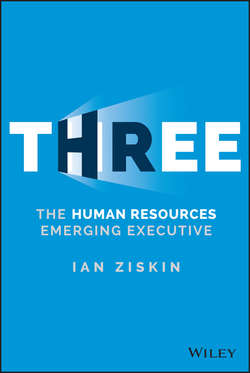Читать книгу Three - Ian Ziskin - Страница 5
На сайте Литреса книга снята с продажи.
Introduction
ОглавлениеIn 1987, I was sitting in my HR boss's office having a feedback discussion related to the recently conducted company succession planning process. It was one of those meetings that turned out to be life-changing on a few levels.
First, the fact that my company, TRW, had a succession planning process was in and of itself more uncommon than I understood at the time. I believed all companies had a real succession planning process. Crazy, right?
Second, I actually thought it was quite common to receive candid feedback from the succession planning process. I believed all companies gave their leaders feedback about their strengths, development needs, and career potential. Crazier still?
Finally, the most remarkable thing of all was receiving the following feedback. My HR boss told me that the senior HR leaders of the company believed I had the potential to someday be the executive vice president of human resources for TRW – what many of us call “chief human resources officer” these days. I was twenty-nine years old and will never forget the first thing that popped out of my mouth, even before I could express gratitude, excitement, disagreement, or fear. Half-shocked, I simply blurted out, “WHY?????”
Some people to whom I have told this story over the years have suggested that, if I were smarter, I would have asked “WHEN?” rather than “WHY?” Trust me, I am just not that smart.
It wasn't that I was questioning the motives or wisdom of the HR leadership. I was instead literally dumbfounded and wondering what they saw in me that I didn't yet see in myself.
My boss did provide me very helpful feedback that day about “WHY?” – some flattering, some developmental, and some downright intimidating. It was great to know someone thought I was a high potential, and frightening to think about the responsibilities and implications of such an endorsement – especially at such an early stage in my career.
But this story is not about the details of the feedback I received, nor is it an ego trip related to being told I was a high potential. The point is that this one discussion embedded an indelible image in my mind about the importance of real feedback – good or bad – and the implications and responsibilities of great development that must accompany the feedback in order to make it meaningful. That one meeting changed my life.
Ever since that day, stimulated by my own experience, I have been obsessed with better understanding how to identify, develop, and prepare leaders for leadership roles. As a career-long HR leader, I have a particular passion for working with and enabling other HR people to figure out what makes for great HR, and for great HR leadership. Therefore, think of this book as a compilation of thirty-three years of many mistakes and a few smart moves made, challenges won and lost, and lessons learned and lessons I should have learned based on my own experiences. It is also a nod to the experiences of hundreds of HR and non-HR leaders – friends and colleagues whom I have had the pleasure to work with and learn from.
THREE is written for high potential HR emerging executives who want to accelerate their effectiveness and business impact, and for the bosses, peers, colleagues, friends, coaches, mentors, and teachers who want to assist them in doing so. There is even something in here for line leaders who are looking for ways to get the most out of their HR people – leaders who want to raise the bar on everyone's expectations of HR, including their own.
Chapters 1 and 2 will make you think about yourself – what you want to be known for as a leader and how well or poorly you are controlling your own destiny by managing your own development. These self-management elements are a crucial foundation to enable HR people to be better leaders themselves, and to therefore bring out the best in others.
Chapters 3 through 10 explore what the very best emerging and experienced HR leaders know and do. These chapters will cause you to consider whether you are focusing on the right capabilities, competencies, and content that will make the biggest difference to your effectiveness as an HR leader – now and in the future.
Chapters 11 and 12 illustrate the importance of learning from others. We will benefit from the unvarnished perspectives of eight academic thought leaders who study and work with HR executives and organizations all over the world, and we will also learn from input provided by over 100 highly experienced and up-and-coming HR colleagues, all of whom have a lot to say about what it takes to be successful as an HR executive.
I am fortunate to be in a profession I love, surrounded by incredible colleagues who make people and organizations more effective. Thanks to them, and to you, for making a difference – every day!
Ian Ziskin
June 2015
Sag Harbor, New York
